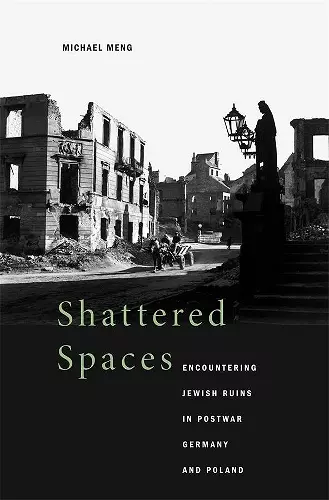Shattered Spaces
Encountering Jewish Ruins in Postwar Germany and Poland
Format:Hardback
Publisher:Harvard University Press
Published:1st Dec '11
Currently unavailable, and unfortunately no date known when it will be back

An excellent book. Meng deftly describes how the material legacy of the Holocaust continues to force people in Eastern and Central Europe to confront the past. He brings ideological concerns, questions of identity and nationalism, architectural ideals, and even quotidian construction issues into a seamless narrative. Debunking any simplistic divide between West and East, he offers a much more nuanced and ambiguous picture that takes into account the complex factors that characterized post-WWII Europe. -- Brian Porter-Szucs, author of Faith and Fatherland Meng deals with a highly original and interesting topic, which has been largely unexplored, in its comparative, transnational aspects. His research is extremely thorough, and his choice of Jewish "shattered sites" in Warsaw, East and West Berlin, Wroclaw, Potsdam and Essen is very judicious, as it allows us to observe both the big scene and smaller local initiatives. -- Saul Friedlander, author of Nazi Germany and the Jews, 1933-1945 In his pathbreaking and perceptive study, Meng digs through the neglected ruins of Jewish urban life after 1945 to uncover fascinating clues about the complex ways in which Germans and Poles dealt with the physical legacy of genocide. Rigorously researched and commendably comparative, the book makes an important contribution to the fields of Jewish history, Holocaust history, and memory studies. -- Gavriel D. Rosenfeld, author of Building after Auschwitz An extraordinary study of remembering and the sites of memory in the aftermath of the Holocaust. Meng poses important questions and offers illuminating insights, while comparing Jewish sites in West Germany, East Germany, and Poland. This is essential reading for anyone interested in understanding the relation of the Holocaust to postwar Central Europe. -- Larry Wolff, author of The Idea of Galicia
After the Holocaust, the empty, silent spaces of bombed-out synagogues, cemeteries, and Jewish districts were all that was left of Jewish life in many German and Polish cities. What happened to this scarred landscape after the war, and how Germans, Poles, and Jews encountered these ruins over the past sixty years, is the story this book tells.
After the Holocaust, the empty, silent spaces of bombed-out synagogues, cemeteries, and Jewish districts were all that was left in many German and Polish cities with prewar histories rich in the sights and sounds of Jewish life. What happened to this scarred landscape after the war, and how have Germans, Poles, and Jews encountered these ruins over the past sixty years?
In the postwar period, city officials swept away many sites, despite protests from Jewish leaders. But in the late 1970s church groups, local residents, political dissidents, and tourists demanded the preservation of the few ruins still standing. Since the collapse of the Soviet Union in 1989, this desire to preserve and restore has grown stronger. In one of the most striking and little-studied shifts in postwar European history, the traces of a long-neglected Jewish past have gradually been recovered, thanks to the rise of heritage tourism, nostalgia for ruins, international discussions about the Holocaust, and a pervasive longing for cosmopolitanism in a globalizing world.
Examining this transformation from both sides of the Iron Curtain, Michael Meng finds no divided memory along West–East lines, but rather a shared memory of tensions and paradoxes that crosses borders throughout Central Europe. His narrative reveals the changing dynamics of the local and the transnational, as Germans, Poles, Americans, and Israelis confront a built environment that is inevitably altered with the passage of time. Shattered Spaces exemplifies urban history at its best, uncovering a surprising and moving postwar story of broad contemporary interest.
An excellent book. Meng deftly describes how the material legacy of the Holocaust continues to force people in Eastern and Central Europe to confront the past. He brings ideological concerns, questions of identity and nationalism, architectural ideals, and even quotidian construction issues into a seamless narrative. Debunking any simplistic divide between West and East, he offers a much more nuanced and ambiguous picture that takes into account the complex factors that characterized post-WWII Europe. -- Brian Porter-Szűcs, author of Faith and Fatherland
Meng deals with a highly original and interesting topic, which has been largely unexplored, in its comparative, transnational aspects. His research is extremely thorough, and his choice of Jewish "shattered sites" in Warsaw, East and West Berlin, Wroclaw, Potsdam and Essen is very judicious, as it allows us to observe both the big scene and smaller local initiatives. -- Saul Friedländer, author of Nazi Germany and the Jews, 1933-1945
In his pathbreaking and perceptive study, Meng digs through the neglected ruins of Jewish urban life after 1945 to uncover fascinating clues about the complex ways in which Germans and Poles dealt with the physical legacy of genocide. Rigorously researched and commendably comparative, the book makes an important contribution to the fields of Jewish history, Holocaust history, and memory studies. -- Gavriel D. Rosenfeld, author of Building after Auschwitz
An extraordinary study of remembering and the sites of memory in the aftermath of the Holocaust. Meng poses important questions and offers illuminating insights, while comparing Jewish sites in West Germany, East Germany, and Poland. This is essential reading for anyone interested in understanding the relation of the Holocaust to postwar Central Europe. -- Larry Wolff, author of The Idea of Galicia
- Winner of Hans Rosenberg Book Prize 2012
- Winner of Laura Shannon Prize 2013
- Nominated for President's Book Award 2010
- Nominated for George L. Mosse Prize 2012
- Nominated for Kulczycki Book Prize in Polish Studies 2012
ISBN: 9780674053038
Dimensions: unknown
Weight: unknown
368 pages